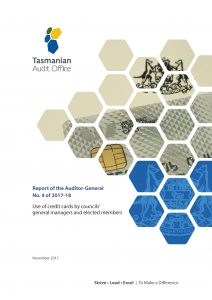About this report or communique
 Report of the Auditor-General No. 4 of 2017-18
Report of the Auditor-General No. 4 of 2017-18
Use of credit cards by councils’ general managers and elected members
There has been a marked increase in the use of debit and credit cards in Australia, with card payments accounting for over 60 per cent of the number of non-cash transactions. Corporate credit cards are an efficient and flexible method to pay for goods and services, particularly for low value transactions, and are now a well-established part of doing business in the public sector.
Cardholders, in the public sector, are also required to assess whether a transaction represents a responsible use of public funds at the time that the expenditure is incurred by confirming that the:
- amount spent is within the public entity’s approved budget
- expenditure is necessary to exercise the pubic entity’s powers or carry out its functions
- expenditure represents value for money (for example, consideration of the financial and non-financial costs and benefits associated with procurement)
However, the convenience of credit cards creates the potential for their misuse. Examples of fraud risks associated with corporate credit cards include charging personal expenses to the card, using the card to withdraw cash for personal benefit or falsifying, destroying or damaging receipts and other records. The misuse of credit cards can also attract considerable public interest and cause damage to a public entity’s reputation.
Local government
Within councils, corporate credit cards are used by employees, including general managers, and elected members (mayors and councillors or aldermen). The Local Government Act 1993 and associated regulations are silent on the use of credit cards in councils. It is therefore the responsibility of general managers to develop and implement policies which ensure that credit cards are used appropriately.
Good practice
In the absence of specific guidance on the use of credit cards in councils, we based our good practice expectations on:
- Treasurer’s Instruction No. 705 Tasmanian Government Card, which provides a policy framework for all agencies covered by the Financial Management and Audit Act 1990
- outcomes of similar audits done in other jurisdictions
- good governance principles.

